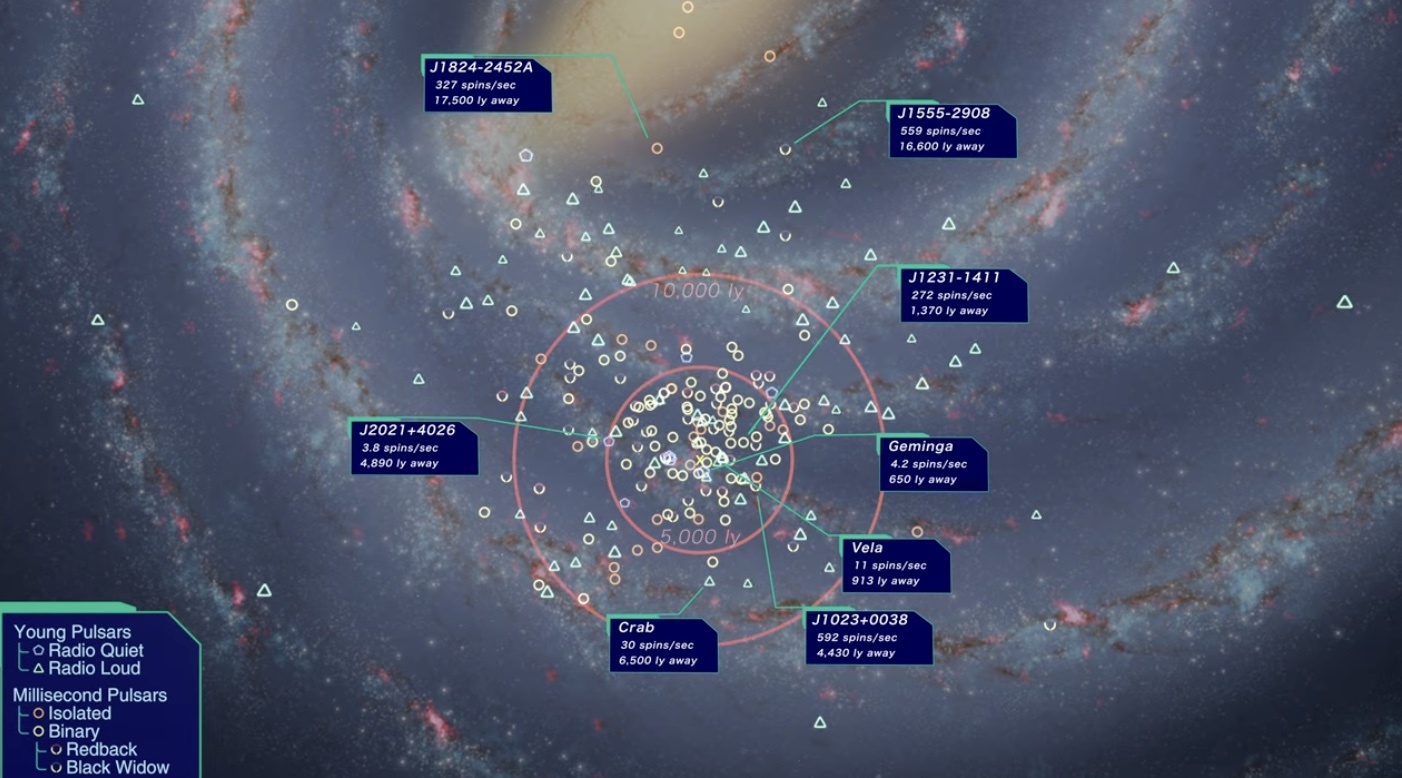“Pulsars touch on a wide range of astrophysics research, from cosmic rays and stellar evolution to the search for gravitational waves and dark matter,” said study coordinator David Smith, research director at the Bordeaux Astrophysics Laboratory in Gironde, France, which is part of CNRS (the French National Center for Scientific Research). “This new catalog compiles full information on all known gamma-ray pulsars in an effort to promote new avenues of exploration.”
29.11.2023

A new catalog produced by a French-led international team of astronomers shows that NASA’s Fermi Gamma-ray Space Telescope has discovered 294 gamma-ray-emitting pulsars, while another 34 suspects await confirmation. This is 27 times the number known before the mission launched in 2008
The catalog was published on Monday, Nov. 27, in The Astrophysical Journal Supplement.
Pulsars are a type of neutron star, the city-sized leftover of a massive sun that has exploded as a supernova. Neutron stars, containing more mass than our Sun in a ball less than 17 miles wide, represent the densest matter astronomers can study directly. They possess strong magnetic fields, produce streams of energetic particles, and spin quickly – 716 times a second for the fastest known. Pulsars, in addition, emit narrow beams of energy that swing lighthouse-like through space as the objects rotate. When one of these beams sweeps past Earth, astronomers detect a pulse of emission.
The new catalog represents the work of 170 scientists across the globe. A dozen radio telescopes carry out regular monitoring of thousands of pulsars, and radio astronomers search for new pulsars within gamma-ray sources discovered by Fermi. Other researchers have teased out gamma-ray pulsars that have no radio counterparts through millions of hours of computer calculation, a process called a blind search.
More than 15 years after its launch, Fermi remains an incredible discovery machine, and pulsars and their neutron star kin are leading the way.
ELIZABETH HAYS
Fermi Project Scientist
Of the 3,400 pulsars known, most of them observed via radio waves and located within our Milky Way galaxy, only about 10% also pulse in gamma rays, the highest-energy form of light. Visible light has energies between 2 and 3 electron volts. Fermi’s Large Area Telescope can detect gamma rays with billions of times this energy, and other facilities have observed emission thousands of times greater still from the nearby Vela pulsar, the brightest persistent source in the sky for Fermi.
The Vela pulsar and its famous sibling in the Crab Nebula are young, solitary objects, formed about 11,000 and 970 years ago, respectively. Their emissions arise as their magnetic fields spin through space, but this also gradually slows their rotation. The younger Crab pulsar spins nearly 30 times a second, while Vela clocks in about a third as fast.
Paradoxically, though, pulsars that are thousands of times older spin much faster. One example of these so-called millisecond pulsars (MSPs) is J1824-2452A. It whirls around 328 times a second and, with an age of about 30 million years, ranks among the youngest MSPs known.
Thanks to a great combination of gamma-ray brightness and smooth spin slowdown, the MSP J1231-1411 is an ideal “timer” for use in gravitational wave searches. By monitoring a collection of stable MSPs, astronomers hope to link timing changes to passing low-frequency gravitational waves – ripples in space-time – that cannot be detected by current gravitational observatories. It was discovered in one of the first radio searches targeting Fermi gamma-ray sources not associated with any known counterpart at other wavelengths, a technique that turned out to be exceptionally successful.
"Before Fermi, we didn't know if MSPs would be visible at high energies, but it turns out they mostly radiate in gamma rays and now make up fully half of our catalog," said co-author Lucas Guillemot, an associate astronomer at the Laboratory of Physics and Chemistry of the Environment and Space and the University of Orleans, France.
The presence of MSPs in binary systems offers a clue to understanding the age-spin paradox. Left to itself, a pulsar’s emissions slow it down, and with slower spin its emissions dim. But if closely paired with a normal star, the pulsar can pull a stream of matter from its companion that, over time, can spin up the pulsar.
“Spider” systems offer a glimpse of what happens next. They’re classified as redbacks or black widows – named for spiders known for consuming their mates. Black widows have light companions (less than about 5% of the Sun's mass), while redbacks have heavier partners. As the pulsar spins up, its emissions and particle outflows become so invigorated that – through processes still poorly understood – it heats and slowly evaporates its companion. The most energetic spiders may fully evaporate their partners, leaving only an isolated MSP behind.
J1555-2908 is a black widow with a surprise – its gravitational web may have ensnared a passing planet. An analysis of 12 years of Fermi data reveals long-term spin variations much larger than those seen in other MSPs. “We think a model incorporating the planet as a third body in a wide orbit around the pulsar and its companion describes the changes a little better than other explanations, but we need a few more years of Fermi observations to confirm it,” said co-author Colin Clark, a research group leader at the Max Planck Institute for Gravitational Physics in Hannover, Germany.
Other curious binaries include the so-called transitional pulsars, such as J1023+0038, the first identified. An erratic stream of gas flowing from the companion to the neutron star may surge, suddenly forming a disk around the pulsar that can persist for years. The disk shines brightly in optical light, X-rays, and gamma rays, but pulses become undetectable. When the disk again vanishes, so does the high-energy light and the pulses return.
Quelle: NASA
